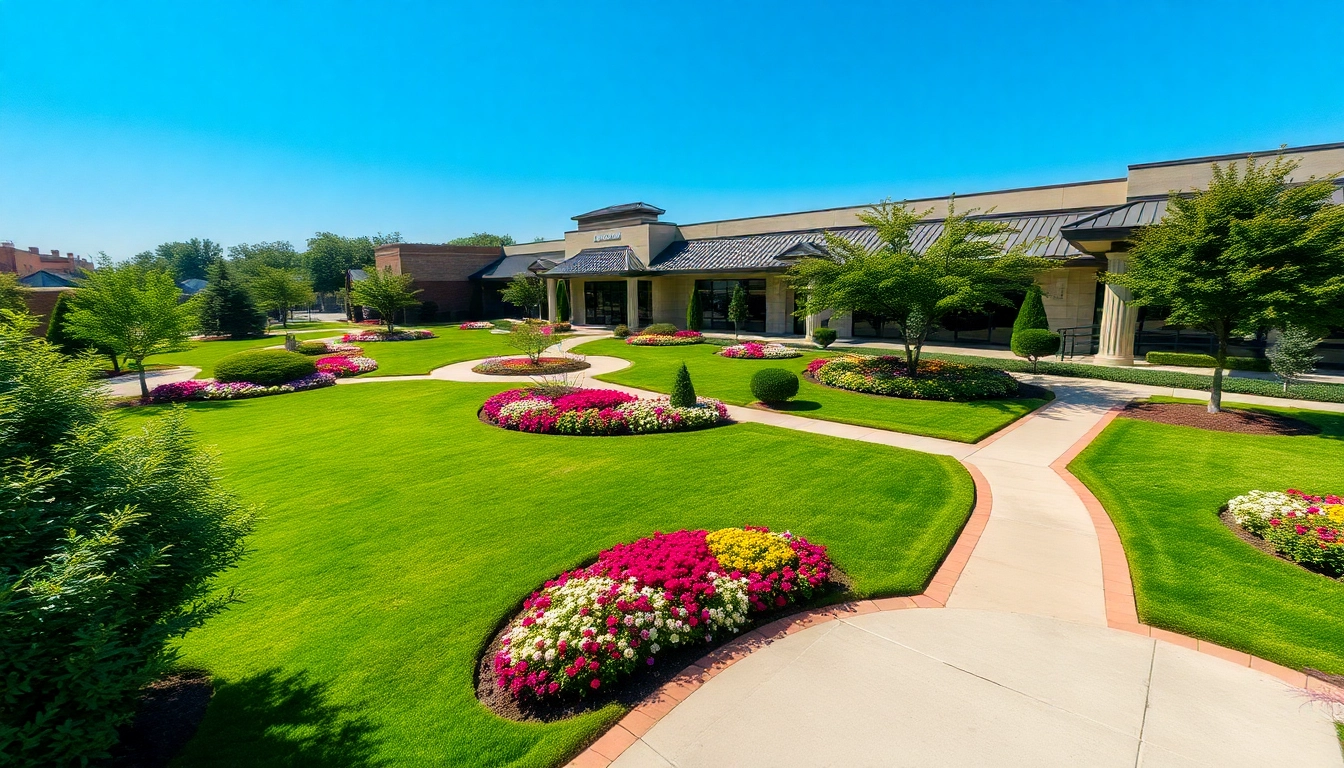Understanding the Role of Commercial Landscaping Contractors
What Do Commercial Landscaping Contractors Do?
Commercial landscaping contractors are specialized professionals who design, install, and maintain landscaping projects for businesses and other commercial properties. Their roles often extend beyond simple lawn care; they are tasked with creating aesthetically pleasing environments that contribute to the overall brand image and functionality of outdoor spaces. Their work includes planning landscape designs that incorporate various elements such as plant selections, irrigation systems, hardscaping (like patios and walkways), and outdoor lighting.
Additionally, commercial landscaping contractors ensure that all designs are sustainable, incorporating native plants that require low maintenance and are suited to the local climate. They perform regular upkeep and care through services such as lawn mowing, pruning, seasonal planting, and pest control, thereby ensuring that the landscapes remain attractive throughout the year. Businesses seeking to enhance their outdoor areas should consider commercial landscaping contractors who can provide tailored services to meet their specific aesthetic and functional needs.
Importance of Professional Landscaping for Businesses
Investing in professional landscaping is essential for businesses for various reasons. Firstly, well-maintained landscapes can improve the aesthetic appeal of a property, enhancing the overall first impression that potential clients and customers receive. This can lead to increased foot traffic and, ultimately, higher revenues. A beautifully landscaped property communicates that a business cares about its environment and values its image.
Moreover, professional landscaping contributes to the functionality of outdoor spaces. Landscaped areas can be designed for leisure, gatherings, or outdoor meetings, promoting a more enjoyable and productive atmosphere for employees and customers alike. Furthermore, good landscaping can also improve environmental sustainability by promoting biodiversity, reducing energy costs through strategic planting that provides shade in the summer, and improving air quality.
Common Services Offered by Contractors
Commercial landscaping contractors provide a broad range of services designed to meet the varied needs of businesses. These services often include:
- Landscape Design and Installation: Custom designs that align with the brand identity of the business.
- Lawn Care: Regular mowing, fertilization, aeration, and weed management.
- Tree and Shrub Maintenance: Pruning, planting, and removal of trees and bushes.
- Irrigation Systems: Installation and maintenance of irrigation systems to ensure efficient water usage.
- Seasonal Displays: Seasonal plant installations that keep the landscape visually appealing year-round.
- Hardscaping Services: Installation of walkways, walls, patios, and other non-plant elements that enhance landscaping.
- Maintenance Services: Ongoing care and management of the property’s landscape to keep it in top condition.
Choosing the Right Contractor for Your Business
Key Factors to Consider When Hiring
Choosing the right commercial landscaping contractor is crucial to the success of your landscaping project. Here are some important factors to consider:
- Experience and Expertise: Look for contractors with a proven track record in commercial landscaping. Their experience can save time and money, as they are more likely to foresee and handle potential issues.
- Licensing and Insurance: Ensure the contractor has the necessary licenses to operate in your area and carries insurance to protect against accidents and damages.
- Portfolio of Work: Evaluate their previous projects. A strong portfolio can provide insight into their style, creativity, and quality of work.
- References and Reviews: Check customer reviews and ask for references. Speaking with past clients can give you an understanding of the contractor’s reputation and service quality.
- Cost Estimates: Obtain detailed quotes from multiple contractors, ensuring that costs are transparent and that you understand what is included in the price.
Evaluating Contractor Portfolios and References
When reviewing potential contractors, take the time to scrutinize their portfolios carefully. Look for projects similar in scope and style to what you envision for your property. Check for diversity in their work, showcasing various design elements, plant types, and hardscaping features.
Furthermore, reach out to references provided by the contractor. Ask about their experience working with the contractor, the quality of work, adherence to deadlines, and the contractor’s approach to problem-solving. This feedback can be invaluable in making your decision.
Questions to Ask Before Committing
Before finalizing your choice, gather as much information as possible by asking the right questions. Consider queries like:
- What is your design process and timeline for project completion?
- How do you handle unexpected issues or changes during the project?
- What maintenance services do you offer after project completion?
- Can you provide a detailed estimate that outlines the costs associated with the project?
- What practices do you follow to ensure environmental sustainability in your landscaping work?
Asking these questions can help clarify your expectations and ensure that you and the contractor are aligned on project goals.
Key Benefits of Hiring Commercial Landscaping Contractors
Boosting Curb Appeal and First Impressions
The exterior of a commercial property is often the first point of contact for potential customers. A well-landscaped property can significantly enhance curb appeal, making a strong first impression. Professional landscaping contributes to the overall aesthetics, encouraging patrons to enter and engage with the business. This increased foot traffic can ultimately elevate sales and brand reputation. Elements like vibrant flower beds, clean pathways, and well-maintained shrubs work together to create a welcoming environment that reflects positively on the business itself.
Enhancing Outdoor Spaces for Employee Wellbeing
A creatively designed and well-maintained outdoor space can enhance employee satisfaction and productivity. Businesses that prioritize landscaping create environments where employees can unwind, collaborate, and enjoy their breaks in nature. Elements like seating areas, walking paths, and green spaces not only provide aesthetic value but also serve as stress reducers, contributing to an overall healthy work-life balance.
Additionally, well-designed landscapes can include features like walking trails or relaxation areas which can encourage employees to engage in physical activities during breaks — promoting a healthier lifestyle which in turn can lead to increased morale and productivity.
Environmental Considerations and Sustainability Practices
In today’s environmentally conscious age, businesses are increasingly held accountable for their ecological footprint. Partnering with commercial landscaping contractors who employ sustainable practices can demonstrate a commitment to environmental stewardship.
Many contractors offer eco-friendly options, such as using native plants that require less water and are more resilient to local pests, reducing the need for chemical treatment. Moreover, practices like rainwater harvesting for irrigation and the installation of permeable paving can contribute to the sustainability of the landscape while also enhancing its aesthetic appeal.
Trends in Commercial Landscaping
Incorporating Native Plants and Eco-Friendly Practices
The trend of incorporating native plants into commercial landscaping is increasingly popular, as these plants thrive in local climates and require minimal maintenance. This not only conserves resources like water but also supports local wildlife, aiding pollinators and maintaining ecosystem health.
Contractors are also increasingly focused on sustainable landscaping practices that minimize environmental impact. The use of organic fertilizers, mulching, and drought-resistant plants are all trending choices that businesses can adopt to promote sustainability while still achieving their landscaping goals.
Innovative Hardscaping Solutions for Businesses
Hardscaping is another critical component of modern commercial landscaping. Businesses are investing in sophisticated hardscaping solutions that include outdoor seating areas, walkways, and decorative features like fountains and retaining walls. These elements are not only functional but also add unique character to the property.
Innovative materials like permeable pavers that allow rainwater to percolate through reduce runoff and encourage groundwater recharge, making hardscaping an essential part of sustainable landscaping designs.
Smart Technology Integration in Commercial Landscaping
The integration of smart technology in landscaping is gaining traction, driven by the desire for efficiency and ease of maintenance. Automated irrigation systems, for example, use soil moisture sensors to optimize watering schedules, ensuring that landscapes receive the right amount of water while conserving resources.
Additionally, landscape lighting systems can be enhanced with smart technology, allowing businesses to control outdoor lighting remotely, adjust brightness, and create automated lighting schedules that improve security and enhance the nighttime aesthetic appeal of the property.
Measuring the Success of Your Landscaping Investment
Setting Clear Goals and Expectations
To measure the success of your landscaping investment, it is imperative to set clear goals and expectations from the outset. Determine what you hope to achieve with your landscaping efforts — whether it’s enhancing curb appeal, creating functional outdoor spaces, or promoting sustainability. Clear objectives will serve as a benchmark for measuring the effectiveness of the contracting work.
Monitoring the Aesthetic and Functional Impact
Assessing the visual appeal and functionality of your landscaped property can be done through various methods. Regularly evaluate how the space meets your intended use and whether it enhances your business’s overall image. Gathering feedback from employees and clients about their perceptions of the landscaped environment can also provide valuable insights into successful elements and aspects that may need adjustments.
Analyzing ROI from Professional Landscaping
Analyzing the return on investment (ROI) from professional landscaping involves measuring the financial benefits gained from an aesthetically pleasing and functional outdoor environment. These benefits can manifest in increased customer traffic, higher employee productivity, and potential reductions in operational costs through energy efficiency and improved sustainability practices.
Calculating ROI can be complex, but gathering data on changes in client engagement, business revenue, employee retention rates, and overall satisfaction can provide a clearer picture of how your landscaping investment is paying off. Documenting these metrics over time will offer a comprehensive view of the long-term value brought by engaging commercial landscaping contractors.



